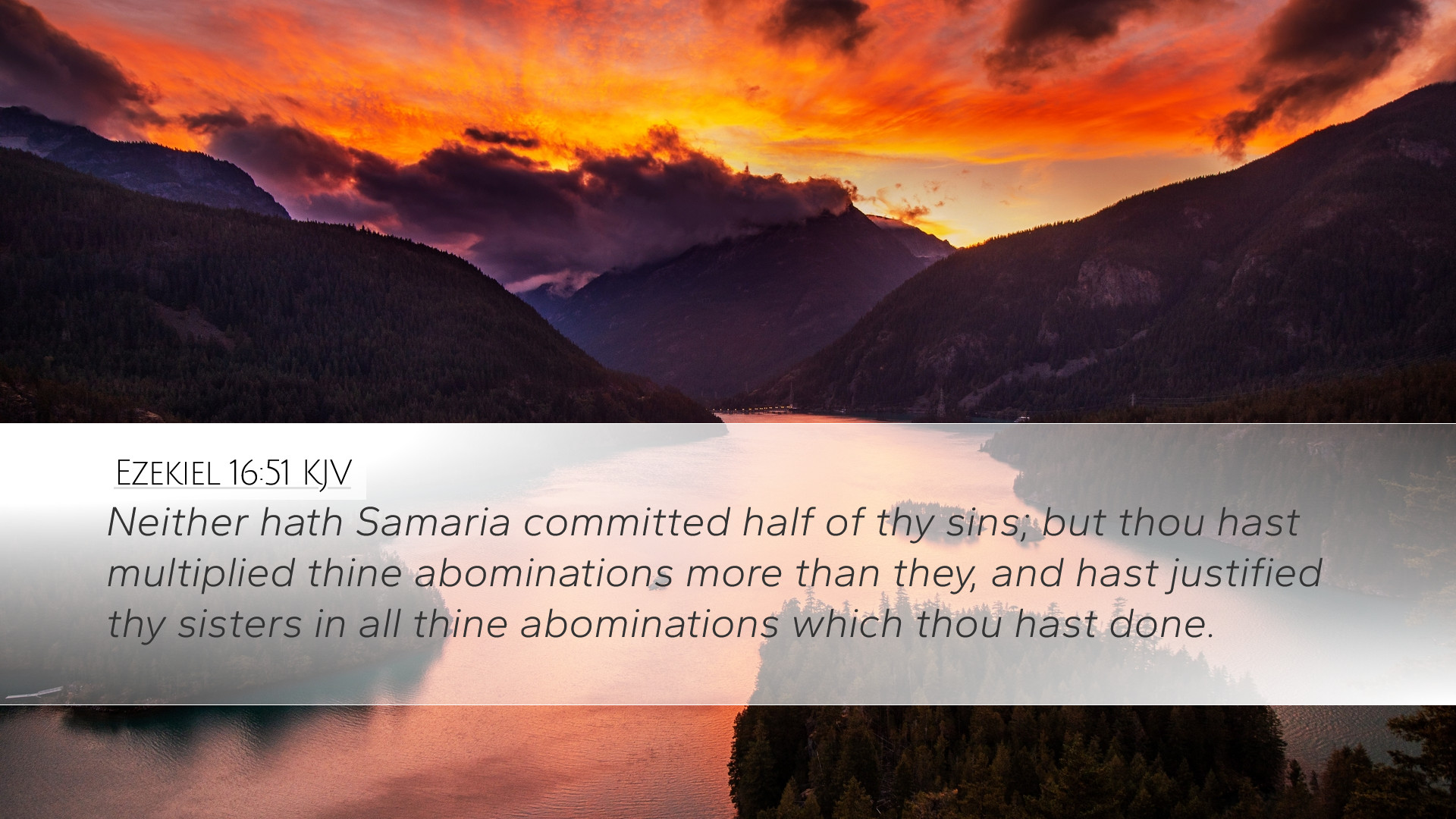Commentary on Ezekiel 16:51
Ezekiel 16:51 (KJV): "When I saw it, I repented of what I had done; and when I saw it, I repented of what I had done; and I was put into consternation."
This verse is part of a larger allegorical passage where God communicates through Ezekiel concerning Jerusalem's unfaithfulness and the consequences of her sins. In this commentary, we will explore the insights derived from prominent public domain commentaries to grasp the theological, historical, and practical implications of this verse.
Thematic Context
To understand Ezekiel 16:51, it is crucial to capture the broader narrative of Israel's rebellious nature portrayed in Ezekiel 16. The chapter contrasts God's lavish provision for Jerusalem and its subsequent ingratitude and unfaithfulness.
1. God's Gracious Love and Care
Matthew Henry emphasizes the profuse grace of God toward His people, likening Jerusalem to a newborn left to perish but was nurtured and brought to maturity. This grace is met with betrayal as the metaphorical bride turns to prostitution, seeking favor from others rather than the One who provided for her.
2. The Depth of Jerusalem's Sin
Albert Barnes highlights the severity of Jerusalem's iniquities, illustrating that they not only rival those of Sodom and Samaria but even surpass them, demonstrating a consistent pattern of rebellion against God's covenant. The mention of God's righteous response indicates a divine necessity to address the corresponding disobedience.
3. The Nature of Repentance
The phrase "When I saw it, I repented" suggests a profound internal reaction on God’s part due to the egregiousness of Israel's transgressions. Adam Clarke points out the anthropomorphic language used here to relate God’s emotional disposition in human terms. It is crucial to note that God’s repentance does not imply He changes in essence but demonstrates His total awareness of the effects of human sin.
Interpretative Insights
1. Divine Remorse and Justice
There is an evident tension between God's love and justice in this passage. Barnes articulates that God's righteousness demands an answer for sin, even as He yearns for repentance. His anguish at Jerusalem's failures can be a point of reflection for how God interacts with humanity. God desires repentance, and His sorrow emphasizes His longing for a restored relationship.
2. The Contrast with Apostasy
Matthew Henry further delineates between “repentance” and “conformity” in apostasy, allowing for a practical takeaway for ministers: genuine repentance is without conditions and born out of a true recognition of sin. The people of Jerusalem felt no shame or repentance. However, God's sorrow teases apart the complexity of relationships, calling individuals back to the covenant faithfulness He offers.
Theological Reflections
1. God as the Covenant Keeper
This passage showcases God’s steadfastness despite Israel's unfaithfulness, reminding scholars and students alike of the enduring nature of divine covenants. Even in their sin, there is a divine hope for redemption, illustrating the profound concept of grace interwoven through the narrative of Israel's journey.
2. The Role of Prophetic Voice
Ezekiel, as a prophet, conveys the weight of God's displeasure but also His heart for His people. Clarke suggests that the responsibilities of prophetic ministry include calling the people to recognize their reliance on God's unfailing love and the urgency of returning to Him in repentance. Herein lies a challenge and reminder for contemporary ministers.
3. Implications for the Church Today
This commentary can serve as a poignant reflection for the modern church representing Christ in their community. Henry encourages a self-examination approach, assessing areas of spiritual unfaithfulness and pointing to the necessity of restoring genuine relationships with God through repenting of individual and communal sins.
Practical Applications
- Heart of Repentance: Regularly engage in self-reflection and steer the community toward genuine repentance.
- Emphasizing God's Faithfulness: Teach congregations about God’s continual call to return to Him, regardless of past indiscretions.
- Emotional Engagement with Scripture: Encourage deeper engagement with the text, understanding the emotional nuances of God's relationship with humanity.
Conclusion
Ezekiel 16:51 serves as a profound reminder of the heart of God towards His people. With insights from Matthew Henry, Albert Barnes, and Adam Clarke, this commentary emphasizes the intricacies of divine love and justice, the necessity of repentance, and the call for the church to embody faithfulness in their covenant with God. It beckons pastors and theologians to reflect back on their commitments while reassuring students of the relentless pursuit of grace found in their journey with God.


